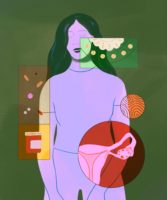
Image by: Michelle Mildenberg
NYTimes
Often misunderstood and misdiagnosed, PCOS can play havoc with your fertility. Here’s how to recognize the symptoms and take action to protect your reproductive health.
The Gist:
- Polycystic ovary syndrome, PCOS, is the most common hormonal disorder of women and a common cause of female infertility, but is often misdiagnosed or overlooked.
- One of the most common symptom of PCOS is irregular periods. Other symptoms can include acne, hair loss on the scalp, excess facial or body hair, obesity and infertility.
- There is no cure for PCOS. Treatment is based on symptoms and whether there is a desire for pregnancy.
- Women with PCOS who do conceive are at greater risk of having pregnancy complications, like gestational diabetes, hypertensive disorders and miscarriage along with other chronic ailments, like obesity, diabetes, hypertension, heart disease, endometrial cancer, sleep apnea, depression and anxiety.
Caroline’s mother was concerned when she turned 15 and hadn’t had her first period. It finally came, but it wasn’t until three months later that she’d get her second. Her gynecologist assured her that irregular periods were common for someone her age, so Caroline’s mother didn’t worry. Then, at 18, her periods disappeared for six months. This time, her college ob-gyn said that the stress of college often causes menstrual periods to wane, and that the best treatment was hormonal therapy to make her periods regular. So she started taking birth control pills… (Click here to read full NYTimes article)

